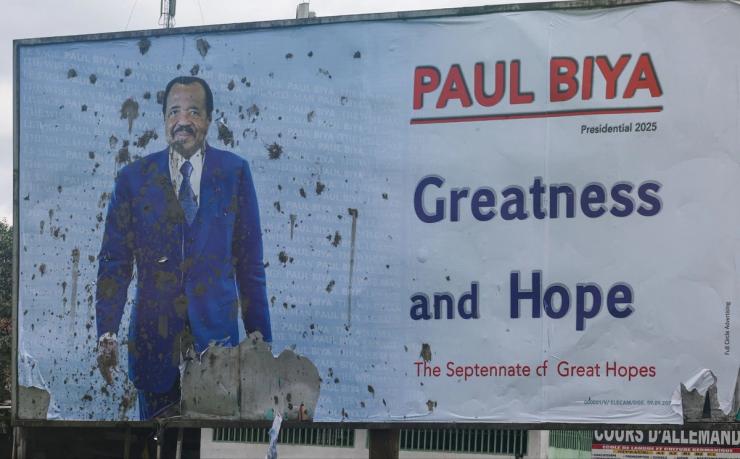The News
Tensions are rising across Cameroon after the Constitutional Council on Monday announced that President Paul Biya, the world’s oldest head of state at 92, won the country’s Oct. 12 presidential election.
Biya took 53.7% of the slightly over 4.6 million valid votes cast, versus 35.2% for the runner-up, Issa Tchiroma Bakary, the Constitutional Council said. The ruling is not subject to appeal.
In recent days, clashes have broken out between opposition supporters and security forces, and reached a tipping point on Sunday, after Tchiroma called for nationwide protests over alleged irregularities in the electoral process. In Douala, Cameroon’s economic hub, security forces used water cannons and tear gas to disperse thousands of protesters, arresting close to 100. Troops also fired live rounds and at least four protesters were killed, according to official sources.
Biya’s 43-year rule faces unprecedented scrutiny as public frustration grows over economic stagnation, corruption, unemployment, the rising cost of living, and security challenges, notably the Boko Haram insurgency in the north and the armed separatist conflict in the English-speaking regions in the west.
In this article:
Know More
Unlike past contests, this vote has unfolded against a backdrop of deep sociopolitical unease and visible youth engagement. Many young Cameroonians, who have known no leader other than Biya, have expressed open dissatisfaction and a desire for political renewal, aligning with Gen Z protests in other countries like Kenya and Madagascar. “We want change, we want change,” they have chanted during rallies.
In a rare campaign outing in the northern city of Maroua on Oct. 7, Biya acknowledged the frustrations of young people and the “unfulfilled expectations that make you doubt the future.” He promised to fix things and that the best was yet to come.
But the vow has not assuaged local youth. Through grassroots and online activism, they have amplified calls for reforms, prompting what digital rights group Paradigm Initiative described as “on-going internet access restrictions in Cameroon in a volatile election environment.” A major outage occurred on Oct. 23, but state-run Cameroon Telecommunications (Camtel) said it was purely technical, relating it to an incident regarding an undersea fiber optic cable, the West Africa Cable System (WACS).
After the results were declared, Biya took to X to “particularly extend my sincere thanks to all the voters who chose me” and to condole with those who lost loved ones as a result of the ongoing post-election violence.
Amindeh’s view
With the official declaration of Biya as winner and some of his main challengers, like Cabral Libii, already extending congratulations, it is now evident that he will remain at the Etoudi Unity Palace — likely until he’s nearly 100 years old, unless he or nature decides otherwise.
The outcome, with no legal means to be overturned, further cements Biya’s decades-long grip on power and underscores the resilience of Cameroon’s entrenched political system, largely based on patronage. While many citizens had hoped for a change, the results confirm continuity with the old guard rather than a shift.
Ongoing protests across the country, though notable in size, passion and spontaneity, have so far largely spared the political capital, Yaoundé. Based on early indications, the demonstrations may not endure for long, especially given the state’s well-known capacity to contain dissent.
As investors keep a close watch on how the post-election landscape unfolds, the real question now is not who governs. Biya’s frailty, his frequent and prolonged absences from public view, and the delegation of his signature authority to his chief of staff since 2019 have long raised concerns about the center of power in Yaoundé. With no clear succession plan in sight, attention would now turn to how Cameroon moves forward under the weight of continuity, and whether reforms, reconciliation, and renewal can still emerge within the familiar shadow of longevity.
Room for Disagreement
Even before the official result was released, opposition figure Tchiroma had declared victory and warned that he would not accept any outcome other than the true will of the ballot box. He has now doubled down on his position, alleging that state-sponsored snipers killed two people amongst those who had gathered around his house in his hometown of Garoua.
“I wonder what will be said this time. Shooting point-blank at your own brothers. I can’t help but wonder if you’re mercenaries. Kill me if you want, but I will liberate this country by any means necessary,” he wrote on Facebook.
Notable
Semafor reported in 2023 on how Cameroon’s Anglophone crisis ended up being fought in Washington with well-paid lobbyists.


